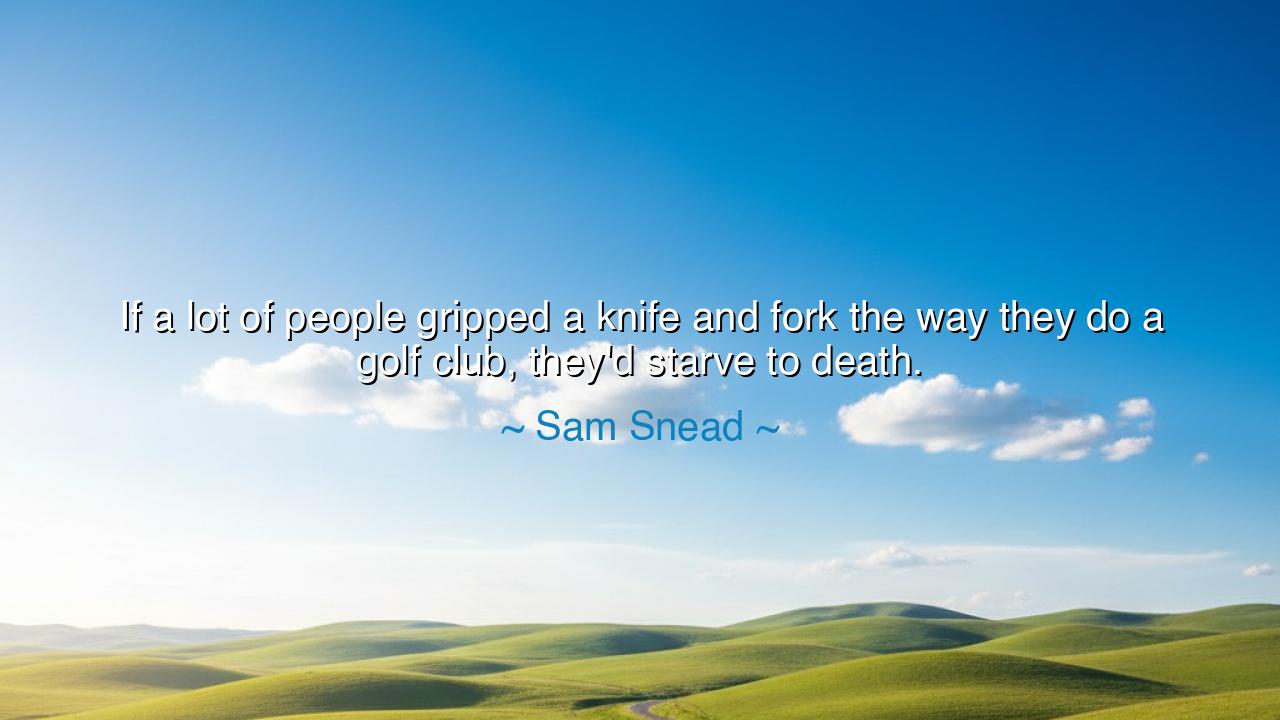
If a lot of people gripped a knife and fork the way they do a
If a lot of people gripped a knife and fork the way they do a golf club, they'd starve to death.






In the marketplaces of sport and the councils of craft, the elders would smile at Sam Snead’s dry thunder: “If a lot of people gripped a knife and fork the way they do a golf club, they’d starve to death.” Hear the jest and the judgment braided together. He speaks of grip, yet he means the whole art of beginning well. For how one holds a tool foretells how one meets the task; the first touch already carries the final consequence. A hand set wrong writes an errant line; a blade held poorly cannot carve; a club misheld cannot guide the ball’s small destiny. Thus the proverb: technique is mercy, and the humble fundamentals are the doors through which excellence must pass.
The saying’s heart is simple and stern: most failure is not the fury of fate but the fruit of small neglects. Many wish for distance while despising stance; they pray for accuracy while ignoring alignment; they crave mastery while treating the basics as the realm of beginners. Snead’s wit exposes the absurdity—were we to dine with the same clumsiness we swing, we’d starve. Therefore, let the learner bow to first things: the pressure of the hands, the placement of the fingers, the calm geometry of posture and aim. For in games and in life, the meal belongs to those who hold rightly what they have received.
As for origin, the line is widely attributed to Snead across golf anthologies and quote collections, reflecting his lifelong insistence that the grip is the gateway to the swing. While compilations preserve the quip more than its precise setting, they pair it with Snead’s reputation for hammering the fundamentals—especially the hands on the club—as the cure for a thousand ills. In these records his remark stands beside other Snead-isms, a teacher’s grin hiding a craftsman’s creed.
That emphasis was no throwaway line. In profiles and instruction roundups, Snead is remembered for calling the poor grip the most common fault he saw in amateurs, the loose thread from which the whole sweater unravels. The great champion—smooth as river water, ruthless about fundamentals—knew that the hands are the only part of the body that actually touch the instrument. If they lie, the ball will testify. Thus his joke points past laughter to law.
Consider a tale from a muni course at dusk. An old pro—spine like a mast, voice like sanded oak—watched a young hitter blister bucket after bucket into the trees. “Show me your hands,” the elder said. He turned the student’s left hand a finger’s breadth, softened the right, and made the boy count out loud: “One…two…” on the takeaway to quiet the rush. Ten balls later the flight straightened, then climbed, then sang. Nothing mystical had changed; only the first touch had been set in truth. The boy looked at his palms as if they’d become a compass. “Keep eating with the right utensils,” the pro winked. “No one wants to starve with a full pantry.”
History offers a sterner witness. The Roman legionary did not survive by courage alone, but by how he gripped his shield and gladius—angles drilled until the body remembered under fear. In every craft, the smallest obedience guards life: the sailor’s knot tied before the gale, the surgeon’s hand position before the incision, the mason’s first course laid perfectly level. Snead’s line is their chorus: do not expect the feast if you scorn the spoon.
What, then, shall we learn? First, enthrone the fundamentals—in golf and beyond. In golf: check the grip before you chase the cure; let pressure be firm yet living; align the “V’s” where a teacher would nod. In work: master the tool before the flourish; in relationships: practice daily courtesies before grand gestures. Second, build a ritual of beginnings. Before each shot (or task), breathe, set, and verify: hands, aim, posture. Third, measure progress by consistency, not novelty; the ordinary done correctly is the hidden engine of the extraordinary.
Finally, carry Snead’s laughter like a lighthouse. Let the line—“If a lot of people gripped a knife and fork the way they do a golf club, they’d starve to death.”—remind you that excellence is not an accident of mood but a marriage to method. Start where the wise always start: with the way you hold the thing that will shape your day. Honor the first touch, and the last result will honor you in return. Then the pantry of your talent will not go to waste, and your table—on the course and in life—will be set with steady bread.






AAdministratorAdministrator
Welcome, honored guests. Please leave a comment, we will respond soon